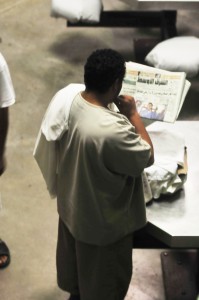“Speaking of Guantánamo”: The Project, Public Memory and Pop Culture
National Dialogue and Traveling Exhibit
Before our Indianapolis reception for the opening of the GPMP exhibit, I was concerned that people would not be thinking of GTMO. I couldn’t have been more wrong. During our preparations for the April 10 event, the internet was ablaze with the word “Guantánamo” because invitations had been circulated among fashion circles for a Coachella party named “New Guantanamo.” The associated images (possibly NSFW due to partial nudity) feature “pleasurable torture” framed as gun-toting models commanding a beach full of bikini-clad, kneeling blindfolded hostages. Due mostly to an immediate editorial from online fashion magazine Refinery29, the backlash to the party was quick and forceful. The party’s sponsors first changed the event name, then cancelled the event, then pulled out of Coachella entirely. Although commentators’ reactions were encouragingly critical, the statement from sponsor Flaunt magazine was tone deaf at best:
In its 15-year history, Flaunt has not shied away from controversy or provocation. We routinely cover topics of social and political contention. At our event, we intend to create an atmosphere of fun, and the spirit and theme were never intended to cause offense or harm. Guantanamo has been controversial from its inception, and that an unresolved human rights issue is again fetching headlines is, in our opinion, true to our aims as a publication. We value and respect the public’s concern and are taking action.
As most readers of this blog are well aware, Guantánamo (taken here to mean GTMO, as opposed to the literal geographic area of Cuba) has been controversial since its inception over a century ago. Nonetheless, the fight to keep the fate of post-9/11 detainees in the headlines has also remained an urgent one—although it is certainly not helped by disingenuous claims to “fun.” In response to this struggle, our IUPUI team explored the issue of ongoing human rights issues through an opening event called “Speaking of Guantánamo,” which featured a conversation between guests who had navigated the “legal black hole” of Guantánamo in the 21st century.
Our featured speakers included Justice Steven H. David (Indiana Supreme Court Justice and former Chief Defense Counsel to the Office of Military Commissions), Richard Kammen, Esq. (an Indianapolis attorney and learned counsel for Abd al-Rahim Hussein Mohammed Al-Nashiri), and Professor George Edwards (Carl M. Gray Professor of Law at Indiana University, expert witness in U.S. Military Commission case against David Hicks, and assisting researcher for the defense of Hicks and Omar Khadr). The event, which counted as a free Continuing Legal Education credit thanks to the partnership of local attorneys and the Robert H. McKinney School of Law, was eye-opening for all of us, from liberal arts students like me to the veteran lawyers in attendance. Although the whole of the speakers’ discussion was fascinating, what I found most striking were additions to the calls we’ve been hearing for so long—calls for courage and dialogue.
In the days after our event, Guantánamo has become a central part of daily news, through the official release of the Detainee Treatment report and heavy coverage of the detainees’ ongoing hunger strikes. In addition, the threat of racial profiling after the bombing of the Boston Marathon and the debate over how and where the surviving bombing suspect should be legally processed remind us of the complex ways our legal system and cultural values have been affected by our fears about national security. Among the most powerful texts published in the last month is an op-ed piece by Samir Naji al-Hasan Moqbel, in which he relays his current experience of being nasally force-fed a liquid diet. But it is also important that this issue is making fairly regular appearances in media like The Daily Show: real concern about Guantánamo is seeping quickly and continuously into highly public, mainstream conversations. Nearly all of the expert commentators I have heard throughout my work on this project have emphasized that the best hope we have of closing Guantánamo is widespread outcry from American citizens. This is based on the premise, I think, that legislators will more likely support closure when the perceived political liability is lessened. There is momentum in current press coverage, but it can only be sustained through continued attention and response. So, even at the end of an academic semester, at a time when many of us are graduating or moving on to new projects, please keep writing letters, signing petitions, and reading everything you can. The time for courage and dialogue is now.
Dolly Hayde – M.A. Candidate at Indiana University-Purdue University Indianapolis (IUPUI)
Indiana University-Purdue University at Indianapolis is participating in the Guantánamo Public Memory Project‘s National Dialogue and Traveling Exhibit. Opening at NYU’s Kimmel Center for University Life Windows Gallery in December 2012 and traveling to 9 sites (and counting) across the country through at least 2014, the exhibit will explore GTMO’s history from US occupation in 1898 to today’s debates and visions for its future. The exhibit is being developed through a unique collaboration among a growing number of universities as a dialogue among their students, communities, and people with first-hand experience at GTMO.

